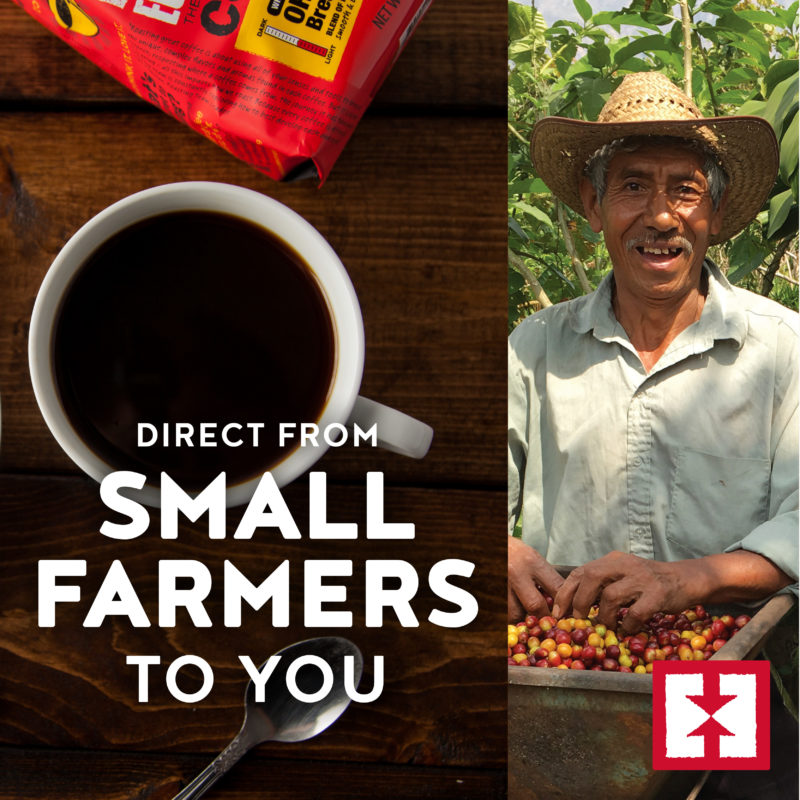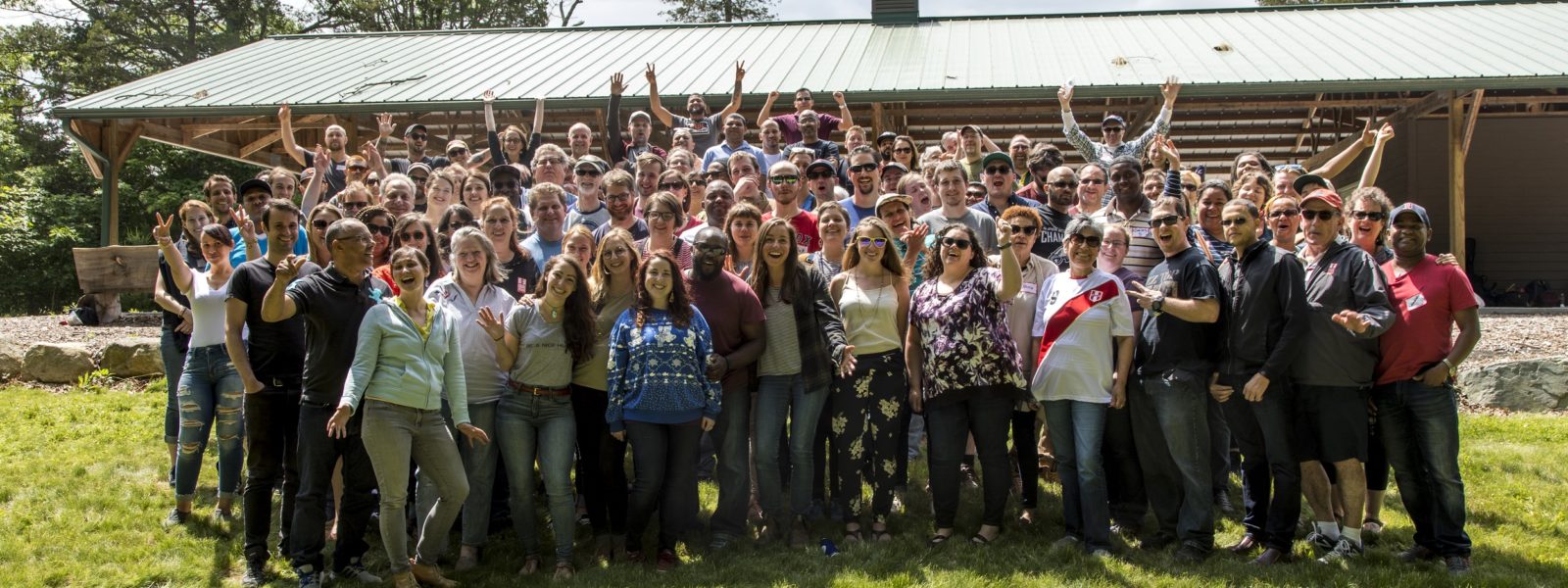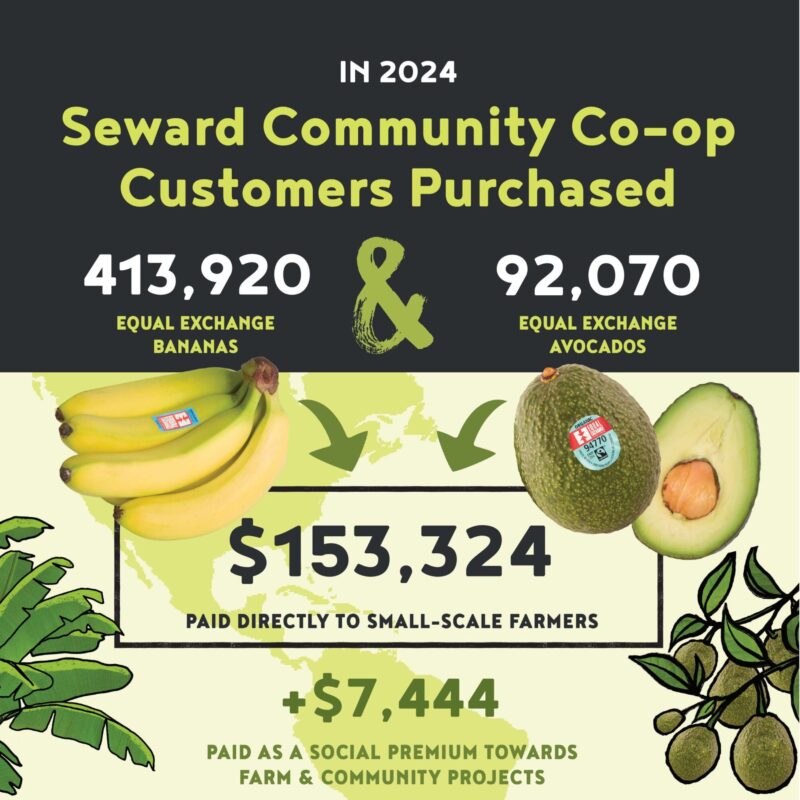Learn About Equal Exchange
From the Produce department to the Bulk and Grocery aisles, you may have noticed a brand called Equal Exchange. You may know they sell coffee, tea, chocolate, nuts, avocados, bananas, but did you know they’re a cooperative? And that they work with small farmer cooperatives to source their coffee, tea, chocolate, bananas, and more?
“At the end of the day, if we’re not cooperating, it’s not going to work,” says River Cook (they/them), a worker-owner at Equal Exchange who manages sales accounts with stores like Seward Co-op and holds ownership in Equal Exchange, which is structured as a worker cooperative. When Equal Exchange was founded in 1986, it was designed to be worker-owned, to mirror the structures of the farmer-owned cooperatives they were working with. It all began with coffee from Nicaragua, which, at the time, was under an embargo imposed by the Reagan administration. To circumvent this, the founders of Equal Exchange, who had been long-time workers at food co-ops, had the coffee beans sent to Amsterdam to be roasted. This small act was considered to add value to the beans, allowing them to be imported to the U.S. as a product of Amsterdam. The container of coffee sat in customs for months, until finally, on May 1, International Worker’s Day, it was released to Equal Exchange. They have been working ever since to develop sustainable and longstanding relationships with small-scale farmer cooperatives, prioritizing economic justice, care for the environment, and a value system that places equity and democracy at the forefront.
 As River explains, Equal Exchange took the idea of working with small-scale, local farmers and imagined it on an international plane. What if high quality, organic, small-scale-farmer-grown products could be made available from around the world, while building a firm supply chain where democratic ownership was preset at every level? This is the idea of Equal Exchange. “How do we raise the whole ship?” River asks. Ultimately, Equal Exchange strives to demonstrate that ownership and input and democratic process at every stage can bring success to each person at every step of the way. Not to mention that this framework of values can thrive even as Equal Exchange grows. River explains this as a liberation of a system of trade, and acknowledges that the capitalist system we live in makes this difficult. “How do we do our best with our values and our mission in a system that is set up to make [the idea of] Equal Exchange not work?”
As River explains, Equal Exchange took the idea of working with small-scale, local farmers and imagined it on an international plane. What if high quality, organic, small-scale-farmer-grown products could be made available from around the world, while building a firm supply chain where democratic ownership was preset at every level? This is the idea of Equal Exchange. “How do we raise the whole ship?” River asks. Ultimately, Equal Exchange strives to demonstrate that ownership and input and democratic process at every stage can bring success to each person at every step of the way. Not to mention that this framework of values can thrive even as Equal Exchange grows. River explains this as a liberation of a system of trade, and acknowledges that the capitalist system we live in makes this difficult. “How do we do our best with our values and our mission in a system that is set up to make [the idea of] Equal Exchange not work?”
Today, Equal Exchange works with over 40 small-scale farmer organizations worldwide, from avocado and banana producers to coffee and tea growers. Look for their logo of two red arrows next time you shop. Buying from Equal Exchange means supporting an alternative system of trade that values cooperative structures, democratic process, and equitable relationships.

 River most values about the relationship is Seward’s willingness “to say yes.” Back when bulk goods, such as nuts, were coming from new farmer partner relationships with Equal Exchange, Seward Co-op was one of the first grocers to say yes to selling the goods in stores. As River explains, “Equal Exchange is doing the work, and Seward Co-op has often been there to say ‘yes’ to the work.”
River most values about the relationship is Seward’s willingness “to say yes.” Back when bulk goods, such as nuts, were coming from new farmer partner relationships with Equal Exchange, Seward Co-op was one of the first grocers to say yes to selling the goods in stores. As River explains, “Equal Exchange is doing the work, and Seward Co-op has often been there to say ‘yes’ to the work.”